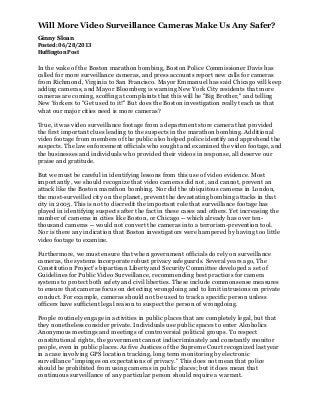
Will More Video Surveillance Cameras Make Us Any Safer? Huffington Post Article
- 1. Will More Video Surveillance Cameras Make Us Any Safer? Ginny Sloan Posted: 06/28/2013 Huffington Post In the wake of the Boston marathon bombing, Boston Police Commissioner Davis has called for more surveillance cameras, and press accounts report new calls for cameras from Richmond, Virginia to San Francisco. Mayor Emmanuel has said Chicago will keep adding cameras, and Mayor Bloomberg is warning New York City residents that more cameras are coming, scoffing at complaints that this will be "Big Brother," and telling New Yorkers to "Get used to it!" But does the Boston investigation really teach us that what our major cities need is more cameras? True, it was video surveillance footage from a department store camera that provided the first important clues leading to the suspects in the marathon bombing. Additional video footage from members of the public also helped police identify and apprehend the suspects. The law enforcement officials who sought and examined the video footage, and the businesses and individuals who provided their videos in response, all deserve our praise and gratitude. But we must be careful in identifying lessons from this use of video evidence. Most importantly, we should recognize that video cameras did not, and cannot, prevent an attack like the Boston marathon bombing. Nor did the ubiquitous cameras in London, the most-surveilled city on the planet, prevent the devastating bombing attacks in that city in 2005. This is not to discredit the important role that surveillance footage has played in identifying suspects after the fact in these cases and others. Yet increasing the number of cameras in cities like Boston, or Chicago -- which already has over ten- thousand cameras -- would not convert the cameras into a terrorism-prevention tool. Nor is there any indication that Boston investigators were hampered by having too little video footage to examine. Furthermore, we must ensure that when government officials do rely on surveillance cameras, the systems incorporate robust privacy safeguards. Several years ago, The Constitution Project's bipartisan Liberty and Security Committee developed a set of Guidelines for Public Video Surveillance, recommending best practices for camera systems to protect both safety and civil liberties. These include commonsense measures to ensure that cameras focus on detecting wrongdoing and to limit intrusions on private conduct. For example, cameras should not be used to track a specific person unless officers have sufficient legal reason to suspect the person of wrongdoing. People routinely engage in activities in public places that are completely legal, but that they nonetheless consider private. Individuals use public spaces to enter Alcoholics Anonymous meetings and meetings of controversial political groups. To respect constitutional rights, the government cannot indiscriminately and constantly monitor people, even in public places. As five Justices of the Supreme Court recognized last year in a case involving GPS location tracking, long term monitoring by electronic surveillance "impinges on expectations of privacy." This does not mean that police should be prohibited from using cameras in public places; but it does mean that continuous surveillance of any particular person should require a warrant.
- 2. Video surveillance systems should also be covered by clear rules requiring that government agents use surveillance footage only for legitimate law enforcement purposes. This includes footage from government cameras, and private videos turned over to police. Thus, once Boston investigators have examined all the video footage they have received, they should retain only the video evidence identified as relevant to the investigation, and should delete the rest. Surveillance footage that simply shows marathon runners, spectators, and other members of the public engaged in normal lawful behavior should not end up in a law enforcement file. In rushing to protect ourselves from the next attack, we should not turn to unregulated government use of surveillance cameras. While we applaud Boston officials for their outstanding investigation, we must remember that video cameras are not an anti-crime or anti-terrorism panacea. The Boston experience demonstrates that video evidence can be important in identifying suspects and building a case. But it does not teach us that Boston -- or anywhere else, for that matter -- needs more surveillance cameras. Ms. Peterson: Summer School English 2013 “Will More Video Surveillance Cameras Make Us Any Safer?” Reading Comprehension and Discussion Questions Directions: • After reading “Will More Video Surveillance Cameras Make Us Any Safer?” answer each of the following questions to the best of your ability. • Be sure to use complete sentences and examples from the text to support your answers for full credit. • Answer the questions in your notebook and leave space to add notes based on our discussion. 1. According to Sloan, do video surveillance cameras prevent major attacks, or events, that occur? 2. What does Sloan believe cameras should focus on? 3. Describe what five Justices of the Supreme Court recognized last year in a case involving GPS location tracking. 4. Is this article pro-‐public surveillance cameras or against them? How do you know? Provide sufficient evidence.